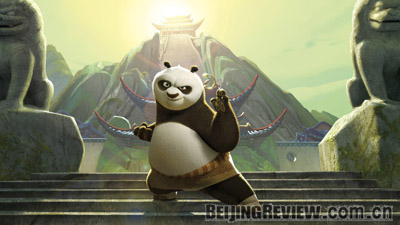|

|
|
The scenes and buildings in Kungfu Panda feature Chinese characteristics.
|
By Zan Jifang
Hollywood has taken China's culture, kungfu and the iconic panda, blended them seamlessly and produced a blockbuster animated movie titled Kungfu Panda. The film's box office takings exceeded 135 million yuan ($19.8 million) in three weeks, making it the first animated movie to top the 100 million yuan ($14.7 million) mark on China's mainland.
Visually the movie hits all the right notes. Traditional Chinese architecture, soft mountain scenery, village characters, dumplings, chopsticks, noodles and the mysterious sacred home of kungfu are all presented in a very Chinese way. The characters, all animals, imitate the actions of Chinese kungfu movies to the letter, while the reluctant panda hero Paul fights like kungfu superstar Jackie Chan.
These Chinese elements aroused the interest and curiosity of Chinese audiences. But despite the huge box office haul, the movie is more of a topic in China for its controversy over exploiting national cultural heritage.
On June 16, Chinese artist Zhao Bandi, whose work mainly deals with pandas, demonstrated in front of the gate of the State Administration of Radio, Film and Television (SARFT), calling on Chinese people to boycott the movie. His reasons for protesting listed in his blog were that it was not appropriate to show the film so soon after the deadly earthquake in Sichuan Province, and that Hollywood has "stolen" Chinese cultural elements to weave an American story about success and make money in China.
The boycott gained momentum and resulted in postponement of the movie's opening in five theaters in Chengdu, capital of Sichuan.
The protest was widely reported by media in China, and sparked a debate about how Chinese should react when their culture is represented in foreign movies and then makes such an impact around the world.
Some netizens left messages saying they support Zhao and will not watch the movie. But the majority of netizens oppose Zhao's stand, saying that his boycott is just an embodiment of narrow-minded nationalism.
"It is better to learn from others than to boycott," said a blogger named Jiu Tiao Ming in his blog. "In this sense, Kungfu Panda comes at the right time."
Actually, it is not the first time that a Hollywood animated movie with Chinese cultural elements became a hit in China. Ten years ago, Mulan, an animated movie about Hua Mulan, a legendary girl in China's history who fought on the battlefield replacing her father and was held up as a female hero, rocked China's animation industry for its exploitation of Chinese cultural legacy.